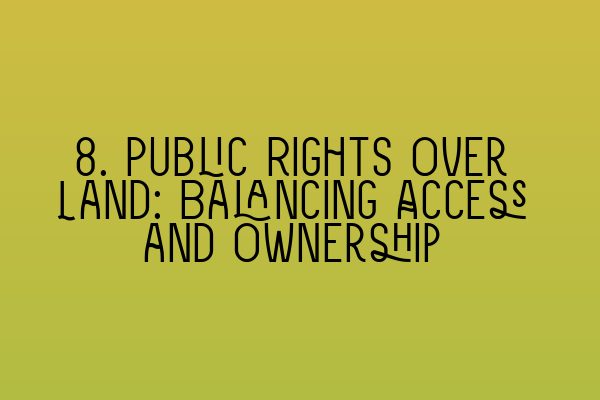**8. Public Rights Over Land: Balancing Access and Ownership**
Welcome to the blog of SQE Property Law & Land Law! In today’s post, we will be exploring the topic of public rights over land and the delicate balance between access and ownership. As solicitors practicing in property law, it is crucial to understand the legal framework surrounding public rights and how they intersect with private land ownership.
Public rights over land refer to the legal entitlements individuals or groups have to access and use certain areas of land that are privately owned. These rights are typically granted for public purposes such as recreation, conservation, or transportation. Balancing these rights with the rights of private landowners is essential to ensure fair and equitable use of land resources.
**Understanding Public Rights Over Land**
Public rights over land can take various forms, including rights of way, access to natural resources, and recreational activities. It is important to note that these rights can be established through legislation, historical usage, or specific agreements between landowners and the public.
One example of a public right over land is the right of way. This grants individuals the legal right to pass through privately owned land, often for the purpose of accessing public roads, footpaths, or beaches. The right of way can be established by a formal grant, long-standing customary use, or by prescription (meaning usage for a specific period of time without objection).
**Balancing Access and Ownership**
Balancing access and ownership can be a complex task, as it requires considering the interests of both the public and private landowners. On one hand, public rights over land are essential for individuals to enjoy public spaces, access amenities, and preserve natural resources. On the other hand, private landowners have a legitimate right to control and manage their property.
To strike the right balance, the law provides certain mechanisms to protect public rights while respecting private property rights. These mechanisms include the establishment of easements, planning regulations, and compulsory purchase powers. Furthermore, it is important for all parties involved to engage in open and transparent discussions to find mutually beneficial solutions.
**Legal Considerations and Disputes**
Public rights over land can sometimes lead to disputes between landowners and the public. These disputes often arise due to conflicting interpretations of the law, changes in land usage, or disagreements over the extent of public access.
In such situations, it is essential to seek legal advice to ensure a fair resolution. As solicitors specializing in property law, we can guide you through the legal complexities of public rights over land and help you understand your rights and obligations.
**Conclusion**
In conclusion, the topic of public rights over land is an intricate one with significant implications for both the public and private landowners. Balancing access and ownership requires a delicate interplay between legal frameworks, social considerations, and the rights of all parties involved.
At SQE Property Law & Land Law, we have extensive experience in navigating the complexities of public rights over land. If you require legal advice or assistance in this area, do not hesitate to get in touch with our team of expert solicitors.
For more information on related topics, feel free to explore our other articles:
– [SQE 1 Practice Exam Questions](https://fqps.co.uk/sqe/sqe1-preparation/mcq-practice-quiz)
– [SQE 1 Practice Mocks FLK1 FLK2](https://fqps.co.uk/sqe/sqe1-preparation/practice-mocks-quiz)
– [SQE 2 Preparation Courses](https://fqps.co.uk/sqe/sqe2-preparation)
– [SQE 1 Preparation Courses](https://fqps.co.uk/sqe/sqe1-preparation)
– [SRA SQE Exam Dates](https://fqps.co.uk/sqe/sqe1-sqe2-exam-dates)
We hope you found this blog post informative and valuable. Thank you for reading!
*[SQE: Solicitors Qualifying Exam, SRA: Solicitors Regulation Authority]*
